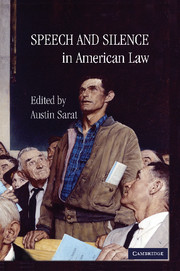Book contents
- Frontmatter
- Contents
- Contributors
- Acknowledgments
- Introduction: Situating Speech and Silence
- 1 “Our Word Is Our Bond”
- 2 Powell's Choice: The Law and Morality of Speech, Silence, and Resignation by High Government Officials
- 3 Anonymous: On Silence and the Public Sphere
- 4 Freedom of Expression, Political Fraud, and the Dilemma of Anonymity
- 5 Speech, Silence, the Body
- Index
- References
Introduction: Situating Speech and Silence
Published online by Cambridge University Press: 04 August 2010
- Frontmatter
- Contents
- Contributors
- Acknowledgments
- Introduction: Situating Speech and Silence
- 1 “Our Word Is Our Bond”
- 2 Powell's Choice: The Law and Morality of Speech, Silence, and Resignation by High Government Officials
- 3 Anonymous: On Silence and the Public Sphere
- 4 Freedom of Expression, Political Fraud, and the Dilemma of Anonymity
- 5 Speech, Silence, the Body
- Index
- References
Summary
The First Amendment's protection of free speech is surely one of America's greatest legal, political, and cultural achievements. As Robert Tsai observes, “Many people believe in the promise of the First Amendment before they set eyes on the actual text. Even if they do not know the precise wording of the instrument, they consider the cluster of rights guaranteed by it to be a badge of citizenship. As more Americans came to accept the virtues of expressive liberty during the twentieth century, the First Amendment became synonymous with social progress.” In addition, it has long been recognized that free speech is a crucial tool of self-governance in a democratic society. Justice Louis Brandeis famously noted, in his concurring opinion in the 1927 case of Whitney v. California, that “[F]reedom to think as you will and to speak as you think are means indispensable to the discovery and spread of political truth.” Moreover, dozens, if not hundreds, of books have been written in praise of free speech and in an effort to understand and assess the Supreme Court's First Amendment jurisprudence.
Beyond our shores, free expression has often been trumpeted as a distinctively American virtue, one that plays an important part in a broader agenda of democratization around the world. In 1947, speaking before a joint session of Congress, President Harry Truman hailed America's commitment to free speech.
- Type
- Chapter
- Information
- Speech and Silence in American Law , pp. 1 - 17Publisher: Cambridge University PressPrint publication year: 2010

